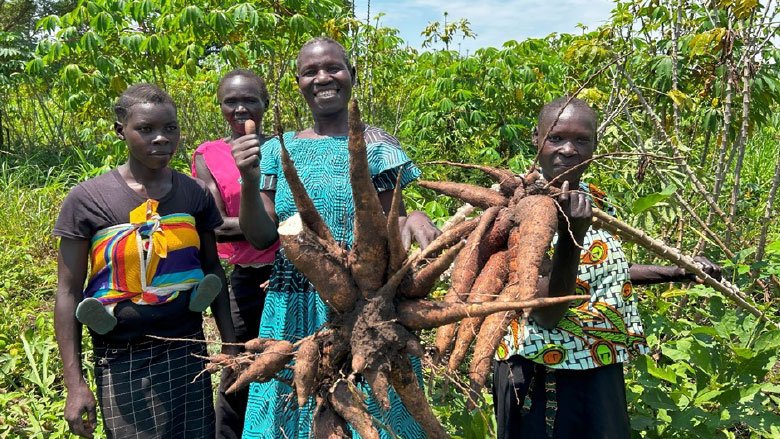Women in Central Equatoria State’s Yei River County are increasingly turning to agriculture as a livelihood to mitigate economic adversities.
Located about 100 miles west of the capital, Juba, Yei has long been recognized for its fertile land and thriving subsistence farming. Currently, around 30 to 43 percent of households in the area grow crops such as maize, cassava, sorghum, beans, groundnuts, simsim, and pigeon peas, among others.
Previously hailed as the food basket of Central Equatoria, Yei’s agricultural potential was severely undermined by years of insecurity. The outbreak of conflict in 2013 and again in 2016 dismantled much of the county’s commercial farming capacity. Farmers were displaced or confined to small, less productive plots close to town, coffee production dropped by more than 70 percent, and many harvests were abandoned. This led to missed planting seasons, food shortages, and a sharp increase in local prices.
Despite these challenges, women in Yei are leading efforts to revive agricultural production. Many are venturing further from the town in search of arable land to expand cultivation.
Among them is a 35-year-old woman, Jenty Oba Elias, who, after losing her small-scale trading business due to the conflict, relocated nine miles south of Yei to an area called Goja along the Yei-Iwotoka Road. With the gradual return of stability, she resumed farming on abandoned plots, determined to rebuild her livelihood through agriculture.
“What I currently do in Yei is cultivation. I was previously farming here in Yei town, but because of a lack of enough space for cultivation, I decided to go and farm in a place called Goja,” she explained. “Usually, after harvest, I take my farm produce to Juba. Ever since I started farming, my life has changed a lot, and I can now pay school fees for my children and pay their hospital bills. I must say, this is the goodness of farming.”
She urged to government to check inflation and stabilize the local currency so that farmers can get better prices for their produce.
For her part, Anna Dawa, a 23-year-old woman, revealed that she is involved in both farming and small-scale business.
“Our survival depends on business, and we divide the profits into savings and consumption, and this is how we survive,” she said. “I know the situation is hard here, but we are managing by working hard. I farm, but not so often. What I am into so much is business, I sell women’s cloths and slippers.”
Meanwhile, Rose Kiden, a women’s leader in Yei Town’s Hai Tarawa suburb, confirmed that many women had embraced farming and trade to survive.
“Women in Yei are indeed hardworking. Even though things are hard and cash is scarce, they still farm and do business. Most of them cultivate vegetables and sell them in the market,” she stated. “People are interested in farming, but the only problem is the issue of the unavailability of land near town. Cultivation in rural areas is not safe due to insecurity. These are the challenges we face in Yei.”
“There is enough food in the rural markets, but insecurity and poor infrastructure pose a serious threat to the people,” Kiden added.
She encouraged women with access to land to venture into agriculture.
This renewed push by women into farming signals a growing resilience in Yei and a hope for restoring its reputation as a vital agricultural hub in Central Equatoria State.
When asked about the general security situation in the county and the potential for large scale farming in rural areas, of Yei River County Commissioner Emmanuel Taban Seme acknowledged sporadic incidents of armed robbers along the main roads linking Yei to the neighboring counties of Morobo, Lainya and Kajokeji, but says these are normal and do not define the general situation of the county.
“These issues of road robberies are happening everywhere, but they do not reflect the general situation of the area,” he said.




